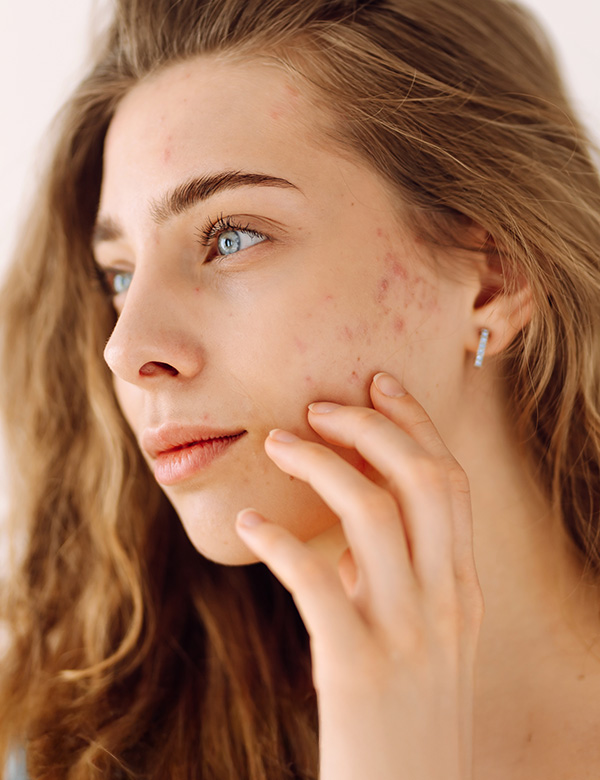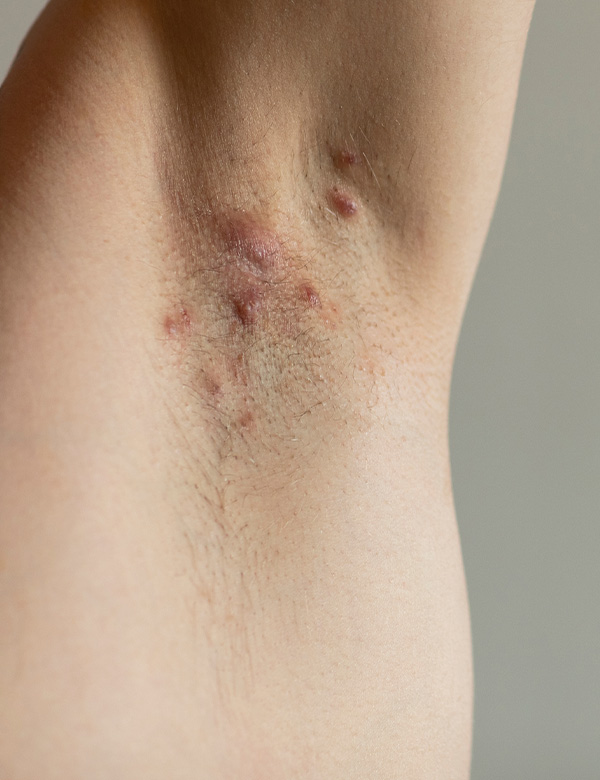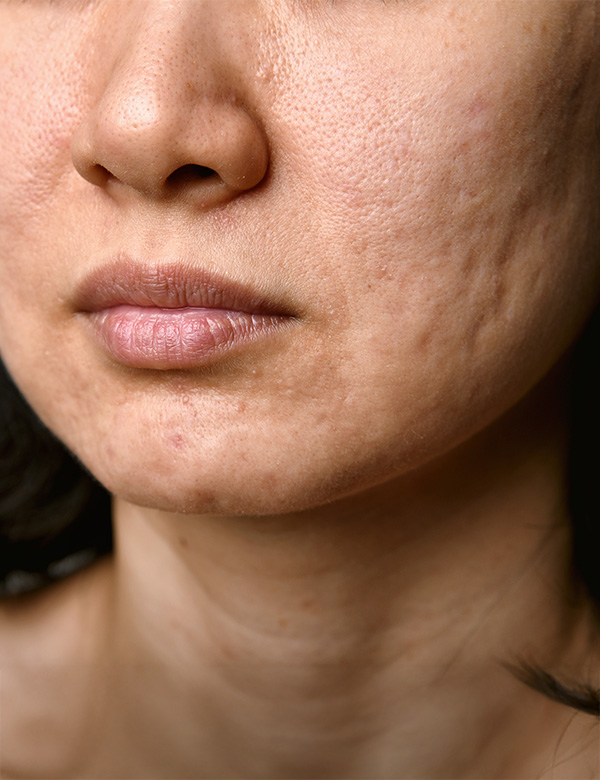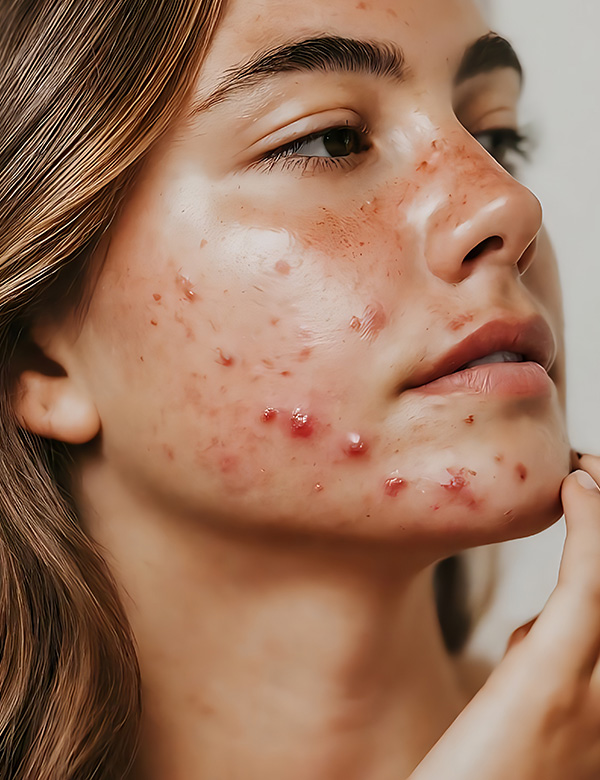Allergy Test
Allergy testing for children and adults by an experienced dermatologist and allergist at Derma Medical Clinic in Zurich – Sihlcity
Allergy Test
Chronische Abszesse und schmerzhafte Knoten durch erfahrenen Hautarzt abklären und behandeln in der Derma Medical Clinic in Zürich - Sihlcity
If you suspect an allergy: We can investigate causes such as rashes, hay fever, shortness of breath, persistent cough or digestive problems using modern allergy diagnostics – including skin allergy tests (prick test), patch tests (epicutaneous test), or a blood test.
Examinations
Prick test
Patch test
Blood test
Procedure
Initial consultation + test selection
Duration
between 20 minutes and 72h
Who Should Get an Allergy Test?
An allergy test is especially helpful if you …
- have repeated skin reactions such as eczema, itching, or hives
- experience coughing, shortness of breath or stomach issues after eating, during pollen season, or from animal contact
- suspect your symptoms are linked to cosmetics, metals, cleaning agents or personal care products
- have reacted strongly to medications, latex or insect stings in the past
- aren’t sure what’s causing your symptoms and want a thorough diagnosis
- suspect your child may have allergies, eczema or intolerances to certain foods and need clarity

Who Should Get an Allergy Test?
An allergy test is especially helpful if you …
- have repeated skin reactions such as eczema, itching, or hives
- experience coughing, shortness of breath or stomach issues after eating, during pollen season, or from animal contact
- suspect your symptoms are linked to cosmetics, metals, cleaning agents or personal care products
- have reacted strongly to medications, latex or insect stings in the past
- aren’t sure what’s causing your symptoms and want a thorough diagnosis
- suspect your child may have allergies, eczema or intolerances to certain foods and need clarity
Treatment
Skin Allergy Test – Prick Test
The prick test is done on the skin of the forearm. Small drops of test solutions are placed on your skin and it is lightly pricked. If the area gets red or forms raised bumps (hives) within 15–20 minutes, this may show an immediate-type allergy.
- Useful for pollen, dust mites, pet dander and certain food allergies. Also well-suited for children.
Patch Test for Contact Allergies – Epicutaneous Test
During this test, patches with allergens are applied to your back and left in place for 48 hours. Then the area is checked. A second reading is done on day 3.
- Useful for allergic reactions to cosmetics, metals (e.g., nickel), fragrances, cleaning products or clothing. Can also be done in children.
Blood Test – Allergy Check via Blood Sample
This test measures specific IgE antibodies, which are often present in the blood during allergies. It is used when a skin test is not possible or when more information is needed.
- Helpful for unclear symptoms, food allergies or to confirm previous results. Also good for children.
What Happens After the Test?
After the results, you’ll receive clear advice on how to avoid allergens, recommendations for relief with medication if needed, or – for certain allergies – information about allergy desensitization (immunotherapy).
How Does Allergy Testing Work?
First consultation & selecting the test
We’ll start by discussing your symptoms, when they happen, and whether you have known allergies. Based on this, we’ll decide which test makes the most sense.
Allergy Test
Depending on what we suspect, we may perform a prick test (on lightly pricked skin) or a blood test. The goal is to clearly identify the cause(s).
Skin Test – Prick Test
Drops of allergens are placed on the forearm and the skin is gently pricked. A reaction usually appears in 15–20 minutes. The test is quick, well-tolerated, and suitable for children.
Patch Test – Epicutaneous Test
Allergen patches are applied to the back and stay there for 48 hours. Reactions are checked on days 2 and 3.
Blood Test
If a skin test isn’t suitable or more information is needed, we draw a blood sample from your arm. The lab checks if your immune system overreacts to certain allergens.

At Derma Medical Clinic, allergy treatment is carried out by Dr. Markus Dendorfer, a dermatologist and qualified allergist.
He has many years of experience in diagnosing and treating allergic conditions – from hay fever to complex allergic responses.

Dr. med. Markus Dendorfer
Board-certified Specialist in Dermatology & Venereology FMH
What You Can Expect from Us
Recognizing allergies
Many allergic reactions appear on the skin – sometimes delayed or in unusual ways. As a dermatology practice with a focus on allergies, we combine both approaches in our evaluations.
Child-friendly testing & support
We use a gentle, child-friendly approach. We explain everything in an age-appropriate way and support families with empathy and clarity.
Personalized consultation
Allergies often don’t come alone. When multiple triggers are involved, we consider their interaction and provide real-life tips, e.g., for diet or skin care.
Everything under one roof
You’ll get diagnosis, medical care, and supportive skin treatment all in one place – with a fixed contact person, short wait times, and coordinated follow-up care.
You think you might have an allergy but don’t know the trigger?
Book your appointment now for allergy testing at Derma Medical Clinic in Zurich – Sihlcity.
FAQ – Frequently Asked Questions About Allergy Testing
What is a skin allergy test (prick test)?
The prick test is a quick and reliable skin test to diagnose immediate-type allergies – such as allergies to pollen, dust mites or pet hair. Small drops of diluted allergens are placed on the forearm and the skin is lightly pricked. If a reaction like redness or a raised bump shows up within 15–20 minutes, the test is positive.
When is a patch test – epicutaneous test – used?
The patch test, also called epicutaneous test, is used for contact allergies – for example to nickel, fragrances, or cosmetics. Patches with allergens are placed on the back and checked after 48 and 72 hours. It helps detect delayed allergic reactions.
What is an allergy blood test (IgE test)?
The blood test checks for IgE antibodies, which may rise in the presence of allergies. It’s useful for diagnosing food allergies, allergic asthma, or sometimes insect venom allergies – especially when skin testing isn’t possible, like in atopic dermatitis or in children.
Which allergy test is right for me?
That depends on your symptoms:
- With immediate reactions like sneezing, shortness of breath, or itching: usually prick test or IgE blood test
- With delayed skin reactions like eczema: patch test
Your doctor will recommend the best test based on your history and symptoms.
How reliable are allergy tests at the dermatologist’s office?
Allergy tests provide useful clues but are not the sole basis for diagnosis. A positive test without symptoms usually doesn’t require treatment. Final evaluation always includes your symptoms and the doctor’s assessment.
What should I keep in mind before an allergy test?
- Don’t take anti-allergy medication 3 days before a skin test
- The test area should not be irritated or inflamed
- Don’t use new cosmetic products before a patch test
- No special preparation needed for the blood test
Is an allergy test painful or dangerous?
No, the tests are usually painless. The skin test (prick test) may cause slight itching; the patch test (epicutaneous) can lead to mild redness. Blood draws are well tolerated. Serious reactions are rare; all tests are done under medical supervision.
What happens if the allergy test is positive?
Then we’ll discuss your next steps – such as avoiding the trigger, taking medication, or starting desensitization. The goal is to reduce your symptoms over time and prevent future reactions.
What’s the difference between desensitization and immunotherapy?
Desensitization and immunotherapy refer to the same thing in medicine: a specific treatment where your body is gradually exposed to an allergen to reduce sensitivity. The aim is to lessen or fully prevent allergic responses. “Immunotherapy” is the more scientific term, “desensitization” is more commonly used.
Who performs allergy tests?
At Derma Medical Clinic in Zurich – Sihlcity, all allergy tests are done by a highly qualified dermatologist with additional training in allergology, using modern diagnostics and providing personalized treatment advice.



